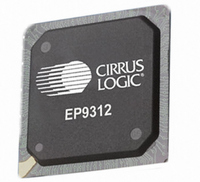EP9312-CB Cirrus Logic Inc, EP9312-CB Datasheet - Page 561

EP9312-CB
Manufacturer Part Number
EP9312-CB
Description
System-on-Chip Processor
Manufacturer
Cirrus Logic Inc
Series
EP9r
Datasheets
1.EP9307-CRZ.pdf
(824 pages)
2.EP9312-IBZ.pdf
(4 pages)
3.EP9312-CB.pdf
(62 pages)
4.EP9312-CB.pdf
(17 pages)
Specifications of EP9312-CB
Peak Reflow Compatible (260 C)
No
A/d Converter
12 Bits
Leaded Process Compatible
No
No. Of I/o Pins
65
Package / Case
352-BGA
Core Processor
ARM9
Core Size
16/32-Bit
Speed
200MHz
Connectivity
EBI/EMI, EIDE, Ethernet, I²C, IrDA, Keypad/Touchscreen, SPI, UART/USART, USB
Peripherals
AC'97, DMA, I²:S, LCD, LED, MaverickKey, POR, PWM, WDT
Number Of I /o
16
Program Memory Type
ROMless
Ram Size
32K x 8
Voltage - Supply (vcc/vdd)
1.65 V ~ 3.6 V
Data Converters
A/D 8x12b
Oscillator Type
External
Operating Temperature
0°C ~ 70°C
Processor Series
EP93xx
Core
ARM920T
Data Bus Width
32 bit
3rd Party Development Tools
MDK-ARM, RL-ARM, ULINK2
Lead Free Status / RoHS Status
Contains lead / RoHS non-compliant
Eeprom Size
-
Program Memory Size
-
Lead Free Status / Rohs Status
No
Other names
598-1257
Available stocks
Company
Part Number
Manufacturer
Quantity
Price
Part Number:
EP9312-CB
Manufacturer:
CIRRUS
Quantity:
20 000
- EP9307-CRZ PDF datasheet
- EP9312-IBZ PDF datasheet #2
- EP9312-CB PDF datasheet #3
- EP9312-CB PDF datasheet #4
- Current page: 561 of 824
- Download datasheet (13Mb)
DS785UM1
15.2.2 IrDA SIR Operation
A start bit is detected when the decoder input is LOW.
Regardless of being in normal or low-power mode, a start bit is deemed valid if the decoder is
still LOW, one period of IrLPBaud16 after the LOW was first detected. This allows a normal-
mode UART to receive data from a low-power mode UART, which may transmit pulses as
small as 1.41 μsec.
The IrDA SIR Encoder/decoder provides functionality which converts between an
asynchronous UART data stream and half-duplex serial SIR interface. No analog processing
is performed on-chip. The role of the SIR encoder/decoder is only to provide a digital
encoded output and decoded input to the UART. There are two modes of operation:
In both normal and low-power IrDA modes, during transmission, the UART data bit is used as
the base for encoding, while during reception the decoded bits are transferred to the UART
receive logic.
The IrDA SIR physical layer specifies a half duplex communication link with a minimum 10ms
delay between transmission and reception. This delay must be generated by software since it
is not supported by the UART. The delay is required since the Infrared receiver electronics
may become biased or even saturated from the optical power coupled from the adjacent
transmitter LED. This delay is known as latency or receiver setup time. Shorter delays may
be able to be used when the link first starts up.
The IrLPBaud16 signal is generated by dividing down the UARTCLK signal according to the
low-power divisor value written to UARTILPR.
The low-power divisor value is calculated as:
where FirLPBaud16 is nominally 1.8432 MHz.
The divisor must be chosen so that 1.42 MHz < IrLPBaud16 < 2.12 MHz.
• In normal IrDA mode, a zero logic level is transmitted as high pulse of 3/16
• In low-power IrDA mode, the width of the transmitted infrared pulse is set to 3 times the
the selected baud rate bit period on the nSIROUT signal, while logic one levels are
transmitted as a static LOW signal. These levels control the driver of an infrared
transmitter, sending a pulse of light for each zero. On the reception side, the incoming
light pulses energize the photo transistor base of the receiver, pulling its output LOW.
This then drives the SIRIN signal LOW.
period of the internally generated IrLPBaud16 signal (1.63 ns assuming a nominal
1.8432MHz frequency) by changing the appropriate bit in UARTCR.
Copyright 2007 Cirrus Logic
Low-power divisor = (FUARTCLK / FirLPBaud16) -1
EP93xx User’s Guide
th
duration of
UART2
15-3
15
Related parts for EP9312-CB
Image
Part Number
Description
Manufacturer
Datasheet
Request
R

Part Number:
Description:
IC ARM920T MCU 200MHZ 352-PBGA
Manufacturer:
Cirrus Logic Inc
Datasheet:

Part Number:
Description:
IC ARM9 SOC UNIVERSAL 352PBGA
Manufacturer:
Cirrus Logic Inc
Datasheet:

Part Number:
Description:
IC ARM920T MCU 200MHZ 352-PBGA
Manufacturer:
Cirrus Logic Inc
Datasheet:

Part Number:
Description:
IC Universal Platform ARM9 SOC Prcessor
Manufacturer:
Cirrus Logic Inc
Datasheet:

Part Number:
Description:
IC Universal Platform ARM9 SOC Prcessor
Manufacturer:
Cirrus Logic Inc
Datasheet:

Part Number:
Description:
Development Kit
Manufacturer:
Cirrus Logic Inc
Datasheet:

Part Number:
Description:
Development Kit
Manufacturer:
Cirrus Logic Inc
Datasheet:

Part Number:
Description:
High-efficiency PFC + Fluorescent Lamp Driver Reference Design
Manufacturer:
Cirrus Logic Inc
Datasheet:

Part Number:
Description:
Development Kit
Manufacturer:
Cirrus Logic Inc
Datasheet:

Part Number:
Description:
Development Kit
Manufacturer:
Cirrus Logic Inc
Datasheet:

Part Number:
Description:
Development Kit
Manufacturer:
Cirrus Logic Inc
Datasheet:

Part Number:
Description:
Development Kit
Manufacturer:
Cirrus Logic Inc
Datasheet:

Part Number:
Description:
Ref Bd For Speakerbar MSA & DSP Products
Manufacturer:
Cirrus Logic Inc












